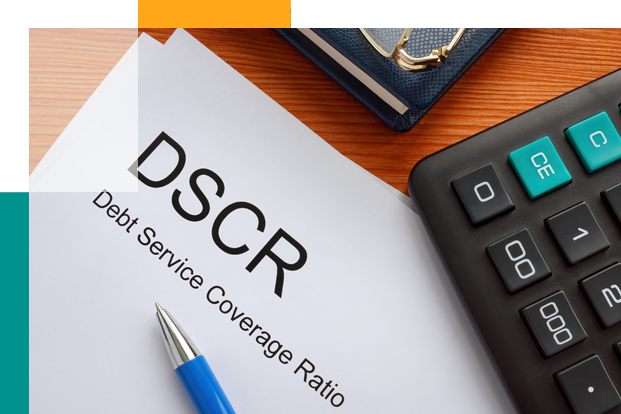Refinancing and DSCR: What Commercial Real Estate Brokers Need to Know

Refinancing commercial real estate can be a powerful tool for investors looking to unlock equity, improve cash flow, or secure better loan terms. However, understanding the impact of refinancing on a property’s Debt Service Coverage Ratio (DSCR) is crucial for commercial real estate brokers and their clients.
In this guide, we will discuss how refinancing can impact DSCR, considerations for refinancing a commercial property with a low DSCR, and strategies to improve DSCR before refinancing.
How Refinancing Can Impact a Property’s DSCR
The role of interest rates in refinancing
Interest rates play a significant role in determining a property’s DSCR during the refinancing process. Lower interest rates can reduce the property’s debt service, leading to a higher DSCR. Conversely, higher interest rates can increase the debt service, resulting in a lower DSCR. Commercial real estate brokers should monitor interest rate trends and advise their clients on the potential impact of refinancing at different rates.
Adjusting loan terms during refinancing
Modifying loan terms, such as extending the loan term or adjusting the loan amount, can also impact a property’s DSCR. Extending the loan term can lower monthly payments and improve the DSCR, while increasing the loan amount may result in a higher debt service and a lower DSCR. Brokers should carefully analyze the potential effects of various loan term adjustments on DSCR before recommending refinancing options to their clients.
Considerations for Refinancing a Commercial Property with a Low DSCR
Risks associated with refinancing low-DSCR properties
Refinancing a commercial property with a low DSCR can be challenging for real estate investors, as lenders may perceive the investment as higher risk. A low DSCR indicates that the property’s cash flow may not be sufficient to cover its debt obligations, making it less likely for investors to secure favorable refinancing terms. Brokers should help their clients understand the risks associated with refinancing properties with a low DSCR and develop strategies to improve their DSCR before refinancing.
Evaluating credit scores and financial stability
Credit scores and overall financial stability play a significant role in the refinancing process for commercial properties. A strong credit score can improve a borrower’s chances of securing better loan terms, even if their property has a low DSCR. Brokers should encourage their clients to maintain good credit scores and financial stability to increase their refinancing options.
Assessing cash flow and rental income
Cash flow and rental income directly impact a property’s DSCR, making them important considerations when refinancing. Brokers should help their clients analyze cash flow and rental income trends to identify areas for improvement and determine whether refinancing is the best option for their specific situation.
Strategies to Improve DSCR Before Refinancing
Reducing operating expenses and taxes
Lowering taxes, insurance, and other operating expenses can enhance a property’s DSCR before refinancing. Brokers can advise their clients on strategies to reduce expenses, such as negotiating better contracts with vendors, implementing energy-efficient upgrades, or appealing property tax assessments.
Boosting rental income
Increasing rental income can also improve a property’s DSCR. Brokers should offer guidance on strategies to increase rental income, such as adjusting rental rates, enhancing the property’s curb appeal, or implementing effective marketing campaigns to reduce vacancy rates.
Optimizing property management and cash flow
Proactive property management and cash flow optimization can help raise a property’s DSCR before refinancing. Brokers should work with their clients to identify areas where property management can be improved, such as by implementing cost-saving measures, streamlining processes, or fostering strong tenant relationships to minimize turnover.
Guiding Clients Through the Refinancing Process
Presenting loan options to clients
Assisting clients in choosing the best refinancing loan option based on their DSCR and financial goals is an important responsibility for commercial real estate brokers. They should present clients with a range of options, including cash-out refinances, traditional refinances, and alternative loan structures, to help them make informed decisions.
Educating clients on the impact of DSCR on refinancing
Helping clients understand the importance of DSCR in the refinancing process for their commercial properties is essential. Brokers should educate clients on how DSCR can affect loan approval, loan terms, and the long-term success of their investments. This knowledge will empower clients to make strategic decisions that maximize their property’s financial performance.
Preparing for Future Refinancing Opportunities
Monitoring market trends and interest rates
Staying informed about market trends and interest rates is crucial for commercial real estate brokers looking to help their clients make informed refinancing decisions. By monitoring economic indicators, industry news, and interest rate forecasts, brokers can provide timely advice to clients about when to refinance and what terms to pursue.
Establishing contingency plans
Assisting clients in developing contingency plans to maintain or improve DSCR in the face of unexpected expenses or changes in the market is another important aspect of a broker’s role. These plans may include strategies for managing unexpected vacancies, dealing with unanticipated maintenance costs, or navigating economic downturns. By helping clients prepare for uncertainties, brokers can support their clients’ long-term investment success.
DSCR and Broker Refinance: The Bottom Line
Understanding the relationship between refinancing and DSCR is essential for commercial real estate brokers and lenders. By guiding clients through the refinancing process and helping them optimize their DSCR, brokers can contribute to successful refinancing outcomes and long-term investment growth.
By staying informed about market trends, interest rates, and DSCR best practices, brokers can provide valuable insights and support to their clients, ensuring their continued success in the competitive world of commercial real estate investing.
Finance Lobby DSCR Content Library
| Topic | Description |
|---|---|
| The Relationship Between DSCR, LTV, and Debt Yield in Commercial Real Estate | Explains how DSCR, LTV, and Debt Yield metrics are interconnected and influence financing decisions in commercial real estate. |
| DSCR Loan Requirements for Different Types of Commercial Properties | Discusses the varying DSCR requirements for different commercial property types, such as retail, office, and industrial properties. |
| How to Optimize a Property’s NOI to Improve DSCR | Provides strategies for optimizing a property’s net operating income (NOI) to improve its debt service coverage ratio (DSCR). |
| Refinancing and DSCR: What Commercial Real Estate Brokers Need to Know | Offers insights on the refinancing process and how DSCR plays a crucial role in securing favorable loan terms. |
| Government-Backed Loan Programs and DSCR Requirements | Explores government-backed loan programs, their DSCR requirements, and how they can be beneficial for commercial real estate financing. |
| Improving DSCR for a Successful Commercial Real Estate Loan Application | Shares tips for improving DSCR to increase the likelihood of a successful commercial real estate loan application. |



